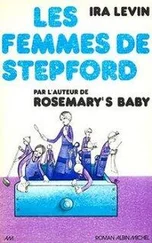“Fine,” the colonel said. “But a little concerned. He had a letter from Günter Wenzler, warning him that Yakov Liebermann may be on to an operation of ours. Liebermann spoke at Heidelberg two weeks ago. He asked the audience a rather unusual ‘hypothetical question.’ A friend of Wenzler’s, whose daughter was there, told him to pass the word, just in case.”
“What exactly did Liebermann ask?”
The colonel looked at Mengele for a moment, and said, “Why we—you and us—would want to kill ninety-four sixty-five-year-old civil servants. A ‘hypothetical question.’”
Mengele shrugged. “So obviously he doesn’t know,” he said. “I’m sure no one came up with the right answer.”
“Rudel is sure too,” the colonel said, “but he’d like to know how Liebermann came up with the right question. It doesn’t seem to surprise you very much.”
Mengele sipped his coffee and spoke casually. “The American wasn’t listening to the tape when we found him. He was talking to Liebermann.” He put his cup down and smiled at the colonel. “As I’m sure you found out from the telephone company yesterday afternoon.”
The colonel sighed and leaned toward Mengele. “Why didn’t you tell us?” he asked.
“Frankly,” Mengele said, “I was afraid you would want to postpone, in case Liebermann got an investigation going.”
“You were right, that’s exactly what we would have wanted,” the colonel said. “Three or four months—would it have been so terrible?”
“It might have changed the results completely. Believe me, that’s true, Colonel. Ask any psychologist.”
“Then we could have skipped those men and picked up on schedule with the others.”
“Reducing the outcome by twenty percent? There are eighteen men in the first four months.”
“And don’t you think you’ve reduced the outcome more this way?” the colonel demanded. “Is Liebermann only talking to students? The men, our men, could be arrested tomorrow! And the outcome reduced by ninety-five percent!”
“Colonel, please,” Mengele placated.
“Assuming, of course, that there is an outcome. So far we have only your word for that, you know!”
Mengele sat silently, inhaled deeply. The colonel lifted his cup, glared at it, set it down again.
Mengele let his breath out. “There will be exactly the outcome I promised,” he said. “Colonel, stop and think a moment. Would Liebermann bother with questions to students if anyone else was listening to him? The men are out, aren’t they? Doing their jobs? Of course Liebermann talked to others—maybe to every prosecutor and policeman in Europe!—but obviously they ignored him. What else would they do?—an old Naziphobe like him coming to them with a story that must sound insane when he can’t give the reason behind it. That’s what I counted on when I made the decision.”
“ It wasn’t your decision to make ,” the colonel said. “You put six of our men into much more danger than we bargained for.”
“And by doing so preserved your very large investment, not to mention the destiny of the race.” Mengele got up and went to the desk, took a cigarette from a brass cup of them. “Anyway, it’s water over the dam,” he said.
The colonel sipped coffee, looking at Mengele’s back. He lowered his cup and said, “Rudel wanted me to call the men in today.”
Mengele turned, took the lighted cigarette from his lips. “I don’t believe that,” he said.
The colonel nodded. “He takes his responsibilities as an officer very seriously.”
“He has responsibilities as an Aryan!”
“True, but he’s never been as sure as the rest of us that the project will work; you know that, Josef. Good Lord, the selling job we had to do!”
Mengele stood silently—hostile, waiting.
“I told him pretty much what you just told me,” the colonel said. “If the men check in and everything’s all right, then Liebermann hasn’t been able to stir anything up, so why not leave them out? He finally agreed. But Liebermann’s going to be watched from now on—Mundt’s taking care of it—and if there’s any sign that he is stirring anything up, then a decision will have to be made: either to kill him, which might only stir things up further, or to bring the men in.”
Mengele said, “Do that and you throw everything down the drain. Everything I achieved. All the money you spent on staff and equipment and arranging the placements. How can he even think of it? I’d send out six more men if these were caught. And six more . And six more! ”
“I agree, Josef, I agree,” the colonel soothed. “And I’d like very much for you to have a voice in the decision if it ever actually has to be made. A strong voice. But if Rudel learns now that you let the men leave knowing Liebermann was alerted—he’ll cut you out of the operation completely. You won’t even get the monthly reports. So I’d rather not tell him. But before I can do that I have to have an assurance from you that you won’t…make any more solo decisions.”
“About what? There are no more decisions to be made, except to keep the men out and working.”
The colonel smiled. “I wouldn’t put it past you to hop on a plane and go after Liebermann yourself.”
Mengele drew at his cigarette. “Don’t be ridiculous,” he said. “You know I wouldn’t dare go to Europe.” He turned to the desk and tapped ash into a tray.
“Do I have your assurance,” the colonel asked, “that you won’t do anything affecting the operation without checking with the Organization?”
“Of course you do,” Mengele said. “Absolutely.”
“Then I’ll tell Rudel it’s a mystery how Liebermann got wind of things.”
Mengele shook his head incredulously. “I cannot believe,” he said, “that that old fool—Rudel, I mean, not Liebermann—would write off so much money, and the Aryan destiny along with it, out of concern for the safety of six ordinary men.”
“The money was only a fraction of what we have,” the colonel said. “We exaggerated its importance to keep you cost-conscious. As for the Aryan destiny, well, as I said, he’s never fully believed the project will work. I think it smacks a little of magic or witchcraft to him; he’s hardly a scientific-minded man.”
“You’d be insane to let him have the final say.”
“We’ll cross that bridge when we come to it,” the colonel said. “ If we come to it. Let’s hope Liebermann stops talking even to students, and you get to make ninety-four checks on this beautiful chart.” He stood up. “Walk me to the plane.” He thrust out a robot-stiff leg and stumped in slow motion, singing: “‘Here comes the bride’—step!—‘All dressed in white’—step! What a nuisance! I’m for simple weddings, aren’t you? But try telling that to a woman.”
Mengele walked him to the plane, waved him into the sky, and went back into the house. His lunch was waiting in the dining room, so he ate it, and then scrubbed his hands at the lab sink and went into the study. He gave the can of enamel a good shaking and used the screwdriver to pry its lid off. He put on his glasses, and holding the can of bright red and the new thin brush, mounted the stepladder.
He dipped the bristles, pared them against the can’s rim, took a steadying breath, and brought the red-tipped brush to the box next to Döring—Deutschland—16/10/74 .
The check came out quite nicely: gleaming red on white, straight-edged and jaunty-looking.
He touched it up a bit and painted a similar check in the box of Horve—Dänemark—18/10/74 .
And Guthrie—V.St.A.—19/10/74 .
Читать дальше











